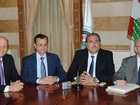General Security chief Maj. Gen. Abbas Ibrahim on Monday described as “temporary” the influx of Syrian and Palestinian refugees from war-torn Syria into Lebanon, rejecting claims that members of al-Qaida have infiltrated the country.
“The numbers released by international organizations are accurate and might be a little higher. They have mentioned 140,000 but there could be 200,000 (Syrian refugees in Lebanon) due to the fact that some of them are not registering their names with the international organizations,” Ibrahim told a delegation from Lebanon's Editors Syndicate.
 Full Story
Full Story
A Lebanese lawyer said he filed a lawsuit on Monday against Syrian Interior Minister Mohammed al-Shaar, accusing him of having ordered hundreds of killings in the northern city of Tripoli in 1986.
Lawyer Tareq Shandab said he filed the case as Shaar is currently undergoing treatment at the American University Hospital for light wounds from a December 12 suicide bomb attack on the interior ministry in Damascus.
 Full Story
Full Story
Lebanese woman Samar Mohammed Sukkariyeh, 23, was found dead on Monday inside her home in the Northern Bekaa town of al-Fakiha, state-run National News Agency reported.
The body was taken to Universal Hospital in Ras Baalbek for examination by a forensic doctor, the agency added.
 Full Story
Full Story
The Turkish Embassy in Lebanon urged on Monday its citizens to be careful and take caution, after the families of the abducted pilgrims in Aazaz threatened to target Turkey's interests in the country.
"We urge the Turkish citizens to refrain from traveling to the country,” the embassy said in a statement to the state-run Anadolu Agency.
 Full Story
Full Story
Three Syrians were kidnapped in the Bekaa region of Baalbek at dawn on Monday, reported the National News Agency.
It said that gunmen kidnapped the Syrians from the town of Ham as they were making their way to the Lebanese border town of Tfeil in the Bekaa.
 Full Story
Full Story
Maronite Patriarch Beshara al-Rahi reiterated on Monday calls on the rival political parties to reach peace, agree on a new electoral law and form a new cabinet capable of safeguarding the country.
During his Christmas message, al-Rahi said that the controversial electoral law is the “basis of our conflicts.”
 Full Story
Full Story
Transportation and Public Works Minister Ghazi al-Aridi stated that the Lebanese factions are “destined” to return to dialogue, reported the daily An Nahar on Monday.
He told the daily: “The Progressive Socialist Party delegation will resume its consultations with various powers over party leader MP Walid Jumblat's initiative to end the political crisis.”
 Full Story
Full Story
Head of the follow-up committee of the 11 Lebanese pilgrims abducted in Syria Sheikh Abbas Zgheib said that their families will probably hold a sit-in on Tuesday near the Baabda Palace to protest the negligence of some officials, he told Voice of Lebanon Radio on Monday.
“The families will hold a sit-in near the presidential palace to protest the negligence of some officials in resolving the problem,” said Zgheib, but assured that the step does not target President Michel Suleiman.
 Full Story
Full Story
Phalange Party leader Amin Gemayel said that President Michel Suleiman fears that the the rival political parties might not resume dialogue, which has spared the country a lot of turbulence.
“The president prioritizes the interests of the country and the Lebanese, he doesn't understand the reasons behind boycotting the all-party talks,” Gemayel told al-Joumhouria newspaper on Monday.
 Full Story
Full Story
March 14 opposition members of the parliamentary subcommittee announced on Monday that they will return to the committee meetings aimed at discussing a new parliamentary electoral law.
They announced, after a meeting held at MP Butros Harb's residence, that they will return to the meetings, which will be held a hotel near the parliament building in downtown Beirut, adding that the discussions should not exceed one week.
 Full Story
Full Story



